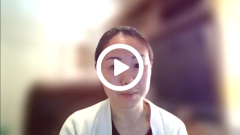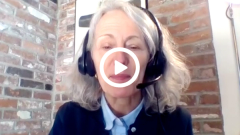
Lenvatinib Shines in the Landscape of Thyroid Cancer Treatments
Lori J. Wirth, MD, discusses the role of lenvatinib following its approval from the FDA for the treatment of patients with radioactive iodine-refractory differentiated thyroid cancer.
Episodes in this series

Lori J. Wirth, MD, associate professor of medicine at Harvard Medical School and medical director of the Center for Head and Neck Cancers at Massachusetts General Hospital, discusses the role of lenvatinib (Lenvima) following its approval from the FDA for the treatment of patients with radioactive iodine (RAI)-refractory differentiated thyroid cancer (DTC).
While other therapies like selpercatinib (Retevmo) and pralsetinib (Gavreto) target specific gene fusions, Wirth explains that lenvatinib is often the first-line choice in the absence of these fusions.
Transcription:
0:09 | Lenvatinib is 1 of our go to drugs for patients with progressing iodine-refractory differentiated thyroid cancer. In the US, there are other therapies that are available for a subset of patients with iodine-refractory differentiated thyroid cancer, namely selpercatinib or pralsetinib for patients with RET fusion-positive disease, and then larotrectinib [Vitrakvi] and entrectinib [Rozlytrek] for NTRK fusion-positive disease.
0:47 | In the absence of those uncommon kinase fusions, lenvatinib is generally considered the first-line therapy for patients when they have progressive iodine-refractory differentiated thyroid cancer. It is interesting because the most common driver alteration that is seen in thyroid cancer is a BRAF V600E mutation, and there is a tissue agnostic approval for dabrafenib [Tafinlar] and trametinib [Mekinist] for BRAF V600E-mutated disease, and that could be considered appropriate to consider in BRAF-mutated iodine-refractory differentiated thyroid cancer as well.
1:32 | However, we do not have a big trial that has investigated dabrafenib or trametinib in this patient population, particularly in the first-line setting. There was a smaller [National Comprehensive Cancer Network (NCCN) sponsored study that was done that did not show activity that seemed to be as good as we saw with lenvatinib in similar patients in the SELECT trial. So most people, I think, consider lenvatinib as an appropriate first-line therapy, even when a patient's disease harbors a BRAF V600E mutation.











































